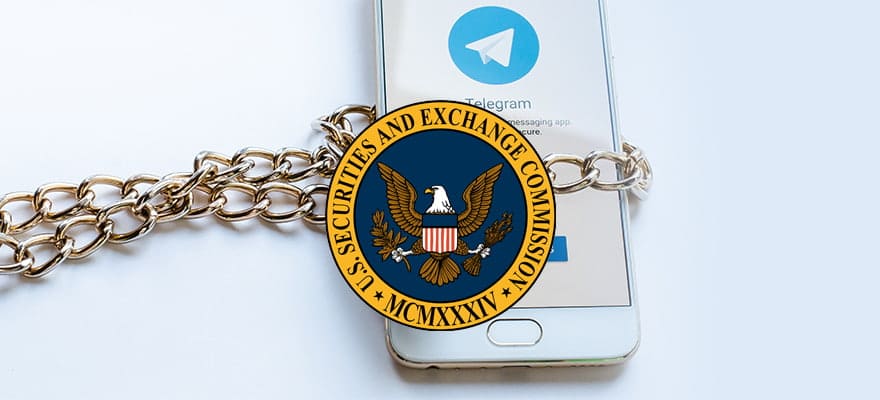Last week, news broke that the United States Securities and Exchange Commission (SEC) had filed against Telegram Group Inc. and TON Issuer Inc., the messaging app and its subsidiary that are collectively responsible for the creation and issuance of the Telegram Open Network (TON) and its native cryptocurrency, Gram tokens.
The filing, which came on October an 11th, amounted to an emergency action that was intended to prevent Telegram from distributing Gram tokens. In it, The SEC accused Telegram of selling unregistered securities.
However, according to Telegram’s counter-filing, its tokens are not securities, and the emergency action filed by the SEC “runs counter to longstanding Supreme Court precedent, the SEC’s own views relating to other Cryptocurrencies , and common sense.”
Telegram also asked the court to deny the SEC’s request for an injunction.
Telegram response to the SEC https://t.co/y0XdJYdupL
— Erik Voorhees (@ErikVoorhees) October 17, 2019
However, the company has said that it is willing to hold off on the distribution of Gram tokens until the legal mess is sorted out. According to a recent email that Telegram sent to investors, the original distribution timeline said that Gram tokens were to be issued at the end of October. However, “the recent SEC lawsuit has made that timing unachievable.” Telegram is now planning to push the launch back to the end of April 2020.
#Telegram is trying to play it cool after the bombshell lawsuit by the SEC. In a letter to investors the company promises decisions on course of action within a week. #TON#cryptocurrencies pic.twitter.com/XxSoZLbkUn
— BLOCKTV (@BLOCKTVnews) October 12, 2019
The lawsuit represents only the most recent instance of the US SEC taking action against cryptocurrency-related companies and projects with increased frequency--in particular, crypto-companies with rather high-profile ICOs. The SEC settled with EOS issuer Block.One in September after filing a similar complaint.
How did Telegram find itself in this position? What does the SEC’s filing mean for the future of the TON project--and for the cryptocurrency industry as a whole?
How did things get to this point?
Here’s what you need to know: according to Telegram, the lawsuit came after 18 months of attempts to negotiate with the SEC.

Braden Perry, Partner at Kennyhertz Perry, LLC.
“Usually the SEC doesn't just sue a company--they vastly prefer to talk to companies first and work something out,” explained David Gerard, author of Attack of the 50 Foot Blockchain : Bitcoin, Blockchain, Ethereum & Smart Contracts, to Finance Magnates. “So, the SEC was talking to Telegram for quite a while.”
However, it seems that at some point, “discussions broke down.”

David Gerard, author of Attack of the 50 Foot Blockchain: Bitcoin, Blockchain, Ethereum & Smart Contracts.
“Telegram refused service of an SEC subpoena, which is an incredibly stupid thing to do,” Gerard explained. “At that point, the SEC filed a suit.”
Braden Perry, Partner at Kennyhertz Perry, LLC, told Finance Magnates that "It’s unclear why the SEC waited to file suit."
"It may have to do with the information it claims it received from investors regarding the claims of return and the alleged concealment of their network and projects. But the SEC ordinarily will not comment or provide instruction outside its official guidance or staff letters. Unfortunately, that leaves regulation by enforcement, in which agencies decide that some practices should have been illegal, and instead of declaring it illegal from now on through rulemaking, go back and prosecute the people who were doing it before."
Prior to when the lawsuit was filed, between January and March of 2018, Telegram raised an eye-popping $1.7 billion during a private fundraising round, $424.5 million of which came from 39 accredited investors based in the US. Interestingly, the private round was so successful that the company made the decision to cancel its public token sale.
The SEC says they are moving to shutdown the cryptocurrency that Telegram raised $1.7 billion for from a bunch of the largest VC's in Silicon Valley. https://t.co/rZ9nDtwTv4
— Nathaniel Popper (@nathanielpopper) October 11, 2019
It’s important to note that (technically speaking), Gram tokens were not sold during this fundraising round. Instead, Telegram sold “Gram Purchase Agreements,” investment contracts, also known as SAFTs--Simple Agreement for Future Tokens. In other words, investors would buy these Gram Purchase Agreements with the promise that they would later be exchanged for Gram tokens.
Telegram’s approach to the token sale was that these Gram Purchase Agreement are securities, but that the Gram tokens that they would eventually be exchanged for are currency. Therefore, the company filed a Form D Exemption with the SEC for Gram Purchase Agreements.
According to a blog post by Telefuel, an app that augments Telegram for “power users,” Regulation D mandates that “companies can sell securities without registering with the SEC if they meet certain qualifications,” including “the condition that the securities being sold contain restrictions on their resale.”
Just published our analysis of the SEC injunction against @telegram, including:
- Key facts - Telegram's statement - Possible outcomes, and - Takes from @prestonjbyrne, @davidgerard, @avichal, and @_marinichevhttps://t.co/aZpjy4zJKi — Alan VanToai (@VanToai) October 16, 2019
However, Telegram did not place any restrictions on the re-sale of Gram tokens themselves: “Telegram, however, claimed that Grams, the heart of the Gram Purchase Agreements, without which the agreements have no value or purpose, were not securities but rather currency,” reads the SEC’s filing. “Telegram thus placed no restrictive legends on any Grams, nor were purchasers advised that they may not sell Grams in the United States absent a registration statement.”
”No more SAFTs [or] presales, and perhaps even no more airdrops.”
David Gerard explained Telegram’s attempted SAFT strategy this way: essentially, companies “sell token futures as a security, in the hope that the tokens themselves won't count as securities when you release them.”
This isn’t exactly an original approach: “a lot of ICOs have tried this,” Gerard explained, adding that the SEC is not having it: “the SEC's filing shows they aren't even considering this--they're just applying the Howey test,” which determines whether or not an asset can be considered a security under US law.
Key Howey Test measure is whether the #token is purchased w/ an "expectation of profit." A functional product replaces profit w/ utility https://t.co/EA486MJvyi
— Chris Burniske (@cburniske) October 1, 2017
In Gerard’s opinion, “SAFTs were always a silly idea.”
“This complaint makes it clear the SEC was never going to take it seriously,” he told Finance Magnates. “You can't turn a security into not-a-security by saying some magic words like ‘utility token.’”
In any case, the SEC’s crackdown on Telegram for using this SAFT structure will likely set an important precedent for other projects that may attempt to pull similar stunts.
“The whole model of a SAFT is challenged and might cease to exist,” wrote Anatoliy Knyazev, executive director and co-founder of cryptocurrency trading platform Exante, in an email to Finance Magnates.

Anatoliy Knyazev, executive director and co-founder of cryptocurrency trading platform Exante.
“[The] SEC clearly states that even if the [Gram] token is issued after the system is fully operational, and thus can qualify as a utility token, the initial investment contract [was] made with an expectation of financial gain from the efforts of others, [thus] failing the Howey test,” Knyazev explained.
“That might mean no more SAFTs [or] presales, and perhaps even no more airdrops"--at least, not in the United States.
Braden Perry explained to Finance Magnates that "much like Kik, Telegram/Ton must essentially argue that this is a case of 'enforcement by regulation.' And they aren’t wrong. The Howey test is notoriously vague and many times based on a case-by-case basis. While I generally do not advocate for additional regulations, more concrete SEC guidance is necessary for ICO issuance."
"The last thing any industry wants is regulation by enforcement, in which agencies decide that some practices should have been illegal, and instead of declaring it illegal from now on through rulemaking, go back and prosecute the people who were doing it before," Perry continued.
"But that regulatory framework will likely lag the innovation, and frustrate those willing to adopt new technology. And for now, it looks like Telegram will have to convince the court that its tokens are not subject to SEC regulations. And that will be a legal issue and likely ripe for a substantive judicial interpretation"--an interpretation that could set important precedents.
Crypto companies “wanted ‘clarity’--and now they're getting it, good and hard.”
The results of this case could also have consequences in terms of how (and if) cryptocurrency companies choose to involve themselves with US investors: “I feel any new blockchain launch, or protocol token launch, will avoid US investors altogether in the future, no matter what kind of a presale agreement they have,” Mikko Ohtamaa, chief technical officer of tokenization platform TokenMarket, told Finance Magnates.
Pauline Shangett, chief communications officer at cryptocurrency exchange ChangeNow, echoed Ohtamaa’s statements: “everyone is already aware that US investors are, well, under very tight protection,” she said to Finance Magnates, adding that “you don't just mess with the SEC, and there's been a TON (pun intended) of similar cases in the past.”

Pauline Shangett, chief communications officer at ChangeNow.
“If things keep going in the same direction, the crypto industry in the States will be at risk of withering plenty soon,” Shangett said.
David Gerard noted that in a way, the industry might be getting exactly what it has asked for: “crypto companies keep saying they want ‘regulatory clarity--but what they mean is they want the ‘clarity’ to do what they wanted to, whatever the law clearly says. They wanted ‘clarity’--and now they're getting it, good and hard.”
Indeed, “the pattern here is that the whole ICO model was to issue unregistered penny stocks. People were loudly warning that these were securities in the US since 2014,” Gerard said. “This is only news to people who are in denial.”
Braden Perry noted that he sees a trend forming in terms of what the SEC's intent seems to be: "traditionally, the SEC would go after companies that allegedly caused harm to investors. With the KIK matter and now Telegram, the SEC appears to shift to the product offering itself, without determination of investor harm. The issue of ICOs as security offerings has been an open one and it seems the SEC is taking the question to court as opposed to providing clear rules, regulations, or guidance."
Patterns in the SEC’s behavior?
Any way you slice it, the SEC has been going after crypto companies for what it claims are unregistered securities offerings with increasing frequency. One of the most recent cases resulted in a $23 million fine against EOS issuer Block.One, which held a $4 billion token sale in 2018.
However, Ohtamaa noted that the SEC might have a much larger punishment in store for Telegram than for Block.One: “Block.One got off the hook with ‘the slap on the wrist’ as the general public perceived it.”
“However, we do not know how many US investors they had in the first place. People see the SEC going after Telegram much more aggressively--some see this as ‘protectionism’ as the US-based team got better treatment,” he added. “Or, it could be that Block.One just has better lawyers.”
The outcome of the Telegram case, along with additional cases in the future, will help to determine what kinds of patterns are forming in the SEC’s behavior: “upcoming promising US-based blockchain projects like Near Protocol will look at this closely,” Ohtamaa said.

Mikko Ohtamaa, chief technical officer of tokenization platform TokenMarket.
In the meantime, though, regulatory uncertainty may already be keeping a number of crypto companies out of US markets: “it is still unclear when cryptocurrency becomes a commodity (in the SEC interpretation) so that it can be distributed to retail investors,” Ohtamaa continued.
These kinds of legal restrictions could potentially impact the security of blockchain networks. Ohtamaa explained that on a typical blockchain, there is “a wide distribution of tokens and nodes to ensure the network security.”
However, “you cannot have a wide distribution if you are not allowed to distribute in the first place;” in other words, a smaller distribution of tokens could result in a more centralized network.
What could happen to Telegram?
So, what does all of this mean for Telegram in particular?
"Telegram/TON was charged was violations of Sections 5(a) and 5(c) of the Securities Act, which generally prohibits the use of the mails or interstate means to sell or offer a security unless a registration statement was filed with the SEC, or was exempt from filing such statement," Braden Perry told Finance Magnates.
"The SEC’s jurisdictional argument is based on the purchase of the tokens by US investors. There should not be an issue with jurisdiction, as a company that offers its services or products in the US is generally subject to regulatory authority. If the SEC is successful, it will seek a cease and desist order eliminating the offering at least to US investors, impose of various kinds of monetary relief, including disgorgement of profits and civil monetary penalties, and also may include corrective measures informing consumers and disclosures in any future product development. It’s obviously disruptive to the company from a reputational and financial perspective. These complaints are highly publicized, and this damage alone is difficult to compute."
David Gerard echoed Perry, telling Finance Magnates that although neither Telegram Group Inc. nor Ton Issuer Inc. is based within the United States, the SEC’s filing against the two companies could still have serious consequences for the companies and the project.
“Telegram's core business operations aren't based in the US--but they have a presence there,” he said, “and Telegram's operations are in jurisdictions that would respect a US judgment against them.” Specifically, “Telegram sold to lots of US investors, and Telegram and those investors want to offload the Grams onto [other] US investors--this is completely in US jurisdiction,” Gerard explained.
In other words, “they're quite touchable legally.”
Possibly - Telegram is legally touchable by US authorities.
I think your scenario of return the US investors' money and keep the token off US exchanges is plausible. note I am not a lawyer! i'm sure Telegram's top-class lawyers will come up with a good response next Thu. — David Gerard (@davidgerard) October 16, 2019
Therefore, if the legal case doesn’t go well for Telegram and Ton Issuer, the two companies could have a lot to lose: “the worst case is losing the case, having to disgorge all the money they got for Grams--including money they've spent already--and pay a fine on top of that.”
Even if the SEC’s filings don’t have a direct effect on Telegram’s operations, Mikko Ohtamaa pointed out to Finance Magnates that the indirect consequences of the filing could have serious effects on Telegram: “Telegram heavily depends on Apple and Google app stores, both publicly listed US companies,” he said.
Therefore, for Ohtamaa, “the worst-case scenario is that Telegram gets pulled from the app stores, their assets are frozen in overseas accounts and also they are dragged to the US lawsuit indefinitely. This doom scenario would kill Telegram overnight.”
Pauline Shangett imagined a worst-case scenario in which investors “won't receive their Grams altogether,” although “that's unlikely to happen since the US jurisdiction doesn't equal worldwide jurisdiction.”
What does the future hold?
Still, it’s possible that US investors may never receive their Grams--or that if they do, it won’t happen for quite some time.
“I think it's quite likely Grams will never be distributed,” David Gerard said to Finance Magnates.
“I don't think Telegram is foolish enough to go ahead right now with the offering, as they were planning,” he continued, adding that “[it] depends if they can convince the court on 24 October to lift the temporary restraining order against them releasing the Gram tokens.”
Braden Perry told Finance Magnates that "if TON tokens are not distributed, the offering documents likely mandate a refund to the investors. This could lead to massive financial difficulties as, according to the SEC’s complaint, the company raised over $1.7 billion from the sales and promised to deliver tokens by October 31, and roughly 33 percent were sales to US investors."
"Miko Ohtamaa predicted that “if Telegram chooses to face the SEC and try to negotiate, it will be delayed indefinitely.”
At this point, however, to go ahead with the token launch would be to move in direct opposition with the SEC: “the only way for them to release tokens with the schedule is that they do it 'rogue' and ignore the SEC notice.”
And indeed, Telegram seems to have agreed to hold off on the launch of the TON blockchain--for now. “However, there is USD $400M investor money there and these investors then would be given tokens that the SEC they should not have,” Ohtamaa said. “It would be an interesting turn of events.”


















